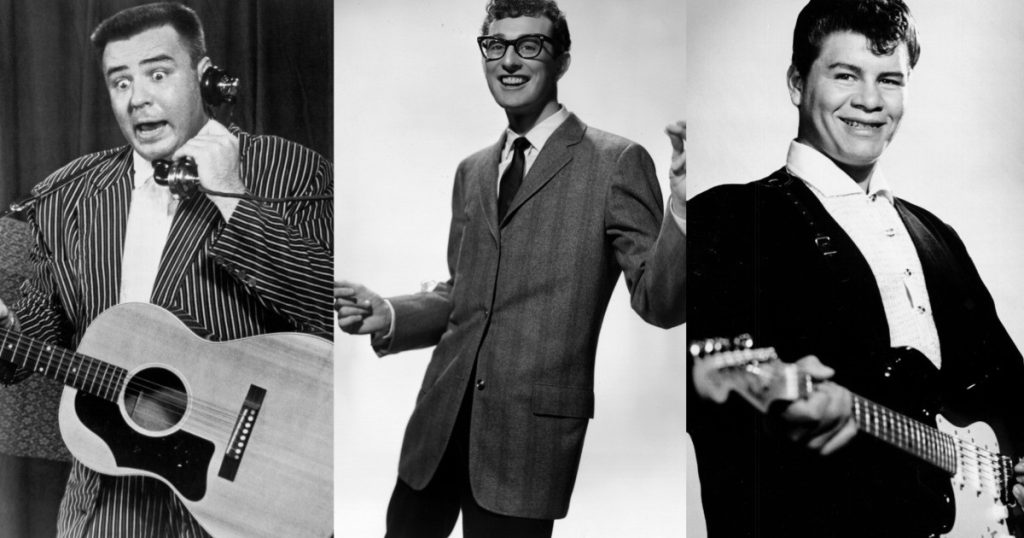On a cold winter night in 1959, the world of music was forever changed by a tragedy that would etch February 3rd into the annals of history as "The Day the Music Died." This catastrophic event claimed the lives of Buddy Holly, Ritchie Valens, and J.P. "The Big Bopper" Richardson, three icons of early rock and roll whose talents had sparked a revolution in the music industry. They were on a tour that promised to bring their groundbreaking sound to eager fans across the Midwest, but fate had a different plan. With the decision to charter a plane to their next gig, these stars were unaware that their next flight would be their last. This moment not only marked the end of what could have been an era of further musical innovation but also began a legacy wrapped in sorrow, inspiration, and a haunting reminder of the fragility of life. How did this tragedy impact the music world, and why does it continue to resonate with us decades later?
Key Takeaway
Day Activities
-
Listening Parties: Fans across the globe host listening parties to honor Buddy Holly, Ritchie Valens, and J.P. "The Big Bopper" Richardson. These gatherings, often filled with the timeless tracks of these legends, serve as a heartfelt tribute. Attendees immerse themselves in the music that once electrified a generation, sharing stories and memories that keep the spirit of '59 alive.
-
Tribute Concerts: Musicians and bands, influenced by the trio's groundbreaking work, stage tribute concerts on February 3rd. From rock and roll venues to intimate acoustic settings, artists cover the iconic songs, echoing the passion and energy that defined Holly, Valens, and Richardson's careers. These live performances not only celebrate their musical legacy but also introduce their timeless sound to new ears.
-
Educational Events: Schools and music institutions often organize educational events to shed light on the significance of "The Day the Music Died." Through documentary screenings, discussions, and interactive sessions, participants delve into the history and impact of that fateful day. This fosters a deeper appreciation among younger generations for the pioneers who shaped the early rock and roll landscape.
Interesting Facts
1. Tragic Trio
On February 3, 1959, Buddy Holly, Ritchie Valens, and J.P. "The Big Bopper" Richardson perished in a plane crash.
2. Fateful Flight
Their plane, a Beechcraft Bonanza, crashed due to a fuel miscalculation, killing everyone aboard instantly.
3. Music's Mourning
This catastrophe ended the golden age of rock and roll, deeply impacting the music industry and fans worldwide.
4. Survivor Tree
A pear tree near the crash site, known as the "Survivor Tree," symbolizes hope and resilience after the tragedy.
5. Legacy Lives On
"The Day the Music Died" continues to inspire musicians, marking a moment of unity and remembrance in music history.
Why We Love This Day
-
Honoring Rock and Roll Legends
Man, losing Buddy Holly, Ritchie Valens, and J.P. "The Big Bopper" Richardson in one fell swoop was a massive blow to the heart of rock and roll. These guys were more than just musicians; they were pioneers who shaped the sound of an era. Celebrating their lives and legacies on this day reminds us of the profound impact they had on music and culture. Their tunes still resonate with fans old and new, proving that true legends never really die. -
Reflecting on Music History
This day serves as a poignant reminder of how fleeting life can be, especially in the fast-paced world of music. Reflecting on the events leading up to the tragic crash, including the decision to charter a plane due to a grueling tour schedule, highlights the pressures and challenges musicians face. It's a moment to ponder the evolution of the music industry since 1959, considering how safety, technology, and artist welfare have changed over the decades. -
Inspiration for Future Generations
Despite the sadness that surrounds February 3, there's also a silver lining. The stories of Holly, Valens, and Richardson have inspired countless musicians and fans to pursue their passions with gusto. Knowing that these icons left such an indelible mark on the world in their short lives encourages others to dream big and make every moment count. It's a powerful reminder that art can transcend tragedy, sparking creativity and unity across generations.
Past & Future Dates
| Month | Day | Year |
|---|---|---|
| FEBRUARY | 3 | 2022 |
| FEBRUARY | 3 | 2023 |
| FEBRUARY | 3 | 2024 |
| FEBRUARY | 3 | 2025 |
| FEBRUARY | 3 | 2026 |
| FEBRUARY | 3 | 2027 |
| FEBRUARY | 3 | 2028 |
FAQ
Why is February 3rd The Day The Music Died?
On Feb. 3, 1959, which would become known as “the day the music died,” rock-and-roll stars Buddy Holly, Ritchie Valens and J.P. “The Big Bopper” Richardson died in a small plane crash near Clear Lake, Iowa.
What 3 celebrities died in The Day The Music Died?
On Feb. 3, 1959, rock stars Buddy Holly, Ritchie Valens, and J.P. Richardson were killed in a plane crash along with 21-year-old pilot Roger Peterson. This incident became known as “The Day The Music Died,” after Don McLean coined it in his 1971 song, “American Pie.”
What happened on The Day The Music Died in February 3 1959?
It's known as the Day the Music Died ― when rock 'n' roll legends-in-the-making Buddy Holly, Ritchie Valens and the Big Bopper died shortly after a plane carrying them to their next gig crashed in a snow-covered Iowa cornfield outside Clear Lake.
What does The Day The Music Died refer to?
Referenced in the lyrics as “the day the music died,” McLean's 1971 song was paying homage to Feb. 3, 1959—the day pop music idols Buddy Holly, Ritchie Valens, and J.P. Richardson, Jr. (“The Big Bopper”) were killed in a plane crash near Clear Lake, Iowa.
